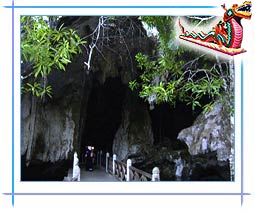Gua Cerita
The Gua Cerita, literally the Cave of Legends, is a fascinating cave on the island of Langkawi. As the name suggests, it is shrouded in legendary tales of mystery and romance. It is easily reachable by boat from Tanjung Rhu. Gua Cherita comprises two limestone caves sited one above the other. Overlooking the azure waters of the sea, this cave is linked with numerous legends.
 Gua Kelawar
Gua Kelawar The Bat Cave, called Gua Kelawar in Malay, is christened after its inhabitants, the Malaysian fruit bats. Located along the Kilim River, the cave is accessible only by boat. One can further walk along a wooden platform across a mangrove swamp, leading towards the cave. Here, the huge stalactites and stalagmites form creepy figures suggestive of eerie creatures.
Gua Buaya
The Gua Buaya, which means Crocodile Cave, is a unique cave through which the Kilim River actually flows. It is accessible by a small boat during low tide. Though named after its early inhabitants, the cave is not influenced by crocodiles anymore. You can check out the brilliant limestone formations and colonies of bats here.
Gua Langsiar
Located on the western coast of Pulau Dayang Bunting, Gua Langsiar is suggested to only serious cavers who have experience of mountain climbing. Moreover, the ascent to the cave requires really good climbing skill and total physical fitness. Also called the Cave of the Banshee, the cave has big gloomy chambers that are infused with lurking shadows. As per the folklores, the cave is haunted by the spirit of a woman who sucks the blood of humans.
Gua Dangli
The Gua Dangli is another beautiful cave that reveals a magnificent variety of stalactites. It is reachable from the sea at low tide. Its sculptured walls boast of giant limestone curtains, umbrellas and mushrooms. The chamber burrows up to a small hole, which leads to a bamboo forest where a second cave is sited at the height of 30 meters on a slope.
Gua Balai
The Gua Balai literally means Hall Cave. It is surrounded with trees, creepers, ferns and palms, which overall lends a picturesque setting to the cave. Gua Balai is marked by the presence of stalactites, which give the appearance of a huge serpent hanging down from the ceiling.
Gua Pasir Dagang
The Gua Pasir Dagang is situated on the shore of Pulau Dayang Bunting. It is easily accessible by the boat, whilst crossing an enthralling island. Pasir Dagang Cave is one of the most fascinating caves, where stalagmites form supernatural figures.
Gua Layang
The Gua Layang, also known as Kite Cave, is a dome-shaped cave, and is accessible by taxis from Kuah town. It is lined with weird-shaped white and grey limestone, along with huge serpent-like stalactites hanging down as if protecting the cave's secret.
Gua Landak
The Gua Landak, literally means Porcupine Cave, is the most easily accessible cave in Langkawi. It takes a few minutes to reach here from Kuah. Its quite large chamber comprises a wonderful variety of stalactites and stalagmites, having beautiful formations.
Gua Tok Sabung
The Gua Tok Sabung is a beautiful cave having the most notable stalactite and stalagmite formations out of all caves in Langkawi. Many of these formations are as nice as quality marble. It is believed that thousands of bats roost within this cave.
Gua Siam
The Gua Siam is a Siamese cave which is located at Sungai Batu Gajah. In the heart of a mangrove swamp, the cave is to be found in a limestone hill. As a matter of fact, skeletal remains of humans, animals and primitive tools have been discovered here. However, the age of the bones is yet to be known.
Gua Pinang The
Gua Pinang is sited off a tributary at Kuala Kubang Badak. It is assumed that the cave must have been under the sea thousands of years ago, since its walls are embedded with copious ancient seashells.



